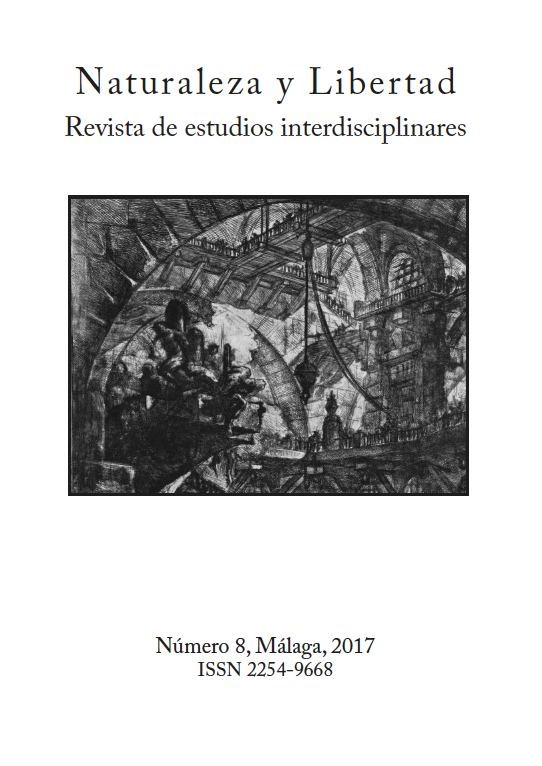El viraje epistemológico de Werner Heisenberg
DOI:
https://doi.org/10.24310/NATyLIB.2017.v0i8.6285Keywords:
mecánica cuántica, positivismo, observable, relación formal,Abstract
El objetivo de este trabajo es estudiar la evolución de la perspectiva epistemológica que experimentó Heisenberg, evolución paralela a la que también experimentó Einstein. Así, Heisenberg fue influido por el segundo, en un principio como creador de la teoría especial de la relatividad y posteriormente como creador de la teoría general de la relatividad, y ambos, en sus inicios, fueron inspirados por los lemas del positivismo de Mach, aunque después se alejaron de esta corriente de pensamiento. Este viraje se presenta paralelo al giro que ambos físicos también realizaron en sus respectivos dominios de investigación y muestra la tensión que sufre el científico que pretende comprender el mundo y se encuentra ante el siguiente dilema: limitarse a los hechos observables o distanciarse para ver las relaciones formales que se dan entre ellosDownloads
Metrics
References
Bohr, N. La teoría atómica y la descripción de la Naturaleza. Madrid, Alianza Editorial, 1988.
Cassidy, D. Uncertainty. The life and science of Werner Heisenberg. New York, W.H.Freeman and Company, 1992.
Einstein, A. “On the Method of Theoretical Physics”. Philosophy of Science, vol. 1, 1934.
Einstein, A.”Autobiographical Notes”. Albert Einstein: philosopher-scientist (Ed. Paul Schilpp) Illinois, The Library of Living Philosophers, 1949, pp. 1-96.
Einstein, A. “Remarks to the Essays Appearing in this Collective Volume”. Albert Einstein: philosopher-scientist (Ed. Paul Schilpp) Illinois, The Library of Living Philosophers, 1949, pp. 663-
Fine, A. The Shaky Game. Realism and the Quantum Theory. Chicago, University of Chicago Press, 1986.
Forman, P. Cultura en Weimar, causalidad y teoría cuántica: 1918-1927. Madrid, Alianza Editorial, 1984.
Heelan, P.A. Quantum Mechanics and Objectivity. A Study of the physical philosophy of W. Heisenberg. The Hague, Martinus Nijhoff, 1965.
Heelan, P. A. “Heisenberg and radical theoretic change”. Zeitschrift für allgemeine Wissenschafstheorie VI/1, 1975
Heisenberg, W. The Physical Principles of the Quantum Theory. New York, Dover Publications, 1930.
Heisenberg, W. “Die Rolle der Unbestimmtheitsrelationen in der modernen Physik”. Monatshefte für Mathematik und Physik, 38, 365-372, 1931.
Heisenberg, W. ”Kausalgesetz und Quantenmechanic”. Erkenntnis zugleich Annalen der Philosophie 2, 172-182, 1931.
Heisenberg, W.”Atomphysik und Kausalgesetz”. Merkur 6, 701-711, 1952.
Heisenberg, W. Física y filosofía. Buenos Aires, La isla, 1959.
Heisenberg, W. Philosophic Problems of Nuclear Science. New York, Fawcett World Library, 1966.
Heisenberg, W. La parte y el todo. Pontevedra, Ediciones Ellago, 1967.
Heisenberg, W. “Problemas filosóficos de la Física de las partículas elementales”. Real Academia de Ciencias Exactas, Físicas y Naturales. Tomo LXIII, cuaderno 3º, 1969. Versión on line.
Heisenberg, W. Más allá de la física. Madrid, Biblioteca de autores cristianos, 1974.
Heisenberg, W. Encuentros y conversaciones con Einstein y otros ensayos. Madrid, Alianza Editorial, 1980.
Heisenberg, W. Gesammelte Werke. Abteilung C, Band I. München, R. Piper&Co. K.G., 1984.
Heisenberg, W. Gesammelte Werke. Abteilung C, Band II. München, R. Piper&Co. K.G., 1984.
Holton, G. Ensayos sobre el pensamiento científico en la época de Einstein. Madrid, Alianza Editorial, 1982.
Jammer, M. The Philosophy of Quantum Mechanics. New York, John Wiley & Sons, 1974.
Jammer, M. The Conceptual Development of Quantum Mechanics. New York, Tomash Publishers,
Lindemann, F. El significado físico de la teoría cuántica. Oxford, Clarendon Press, 1932.
Mach, E. Conocimiento y error. Buenos Aires, Espasa-Calpe, 1948.
Mach, E. Análisis de las sensaciones. Barcelona, Altafulla, 1987.
Messiah, A. Mecánica Cuántica. Madrid, Editorial Tecnos, 1983.
Pais, A. Inward Bound. Oxford, Clarendon Press, 1988.
Platón. Obras completas. Madrid, Aguilar, 1974.
Sánchez Ron, J.M. Historia de la física cuántica. El período fundacional (1860-1926). Barcelona, Crítica, 2001.
Schrödinger, E. Collected Papers on Wave Mechanics. New York, Chelsea Publishing Company, 1982.
Downloads
Published
How to Cite
Issue
Section
License
Those authors who have publications with this journal, accept the following terms:
1. Copyright and licensing information are clearly described on the journal’s web site: all content published in Naturaleza y Libertad is open acces without limit, and are subject to the Attribution-NonCommercial-ShareAlike 4.0 International (CC BY-NC-SA 4.0) license. The full text of which can be consulted at https://creativecommons.org/licenses/by-nc-sa/4.0/
2. It is the responsibility of the authors to obtain the necessary permissions for the images that are subject to copyright. The authors whose contributions are accepted for publication in this journal will retain the non-exclusive right to use their contributions for academic, research and educational purposes, including self-archiving or deposit in open access repositories of any kind. The electronic edition of this magazine is edited by the Editorial de la University of Malaga (UmaEditorial), being necessary to cite the origin in any partial or total reproduction.
3. This journal allows and encourages authors to publish papers on their personal websites or in institutional repositories, both before and after their publication in this journal, as long as they provide bibliographic information that accredits, if applicable, your posting on it.
4. In no case will anonymous papers be published.





18.png)













